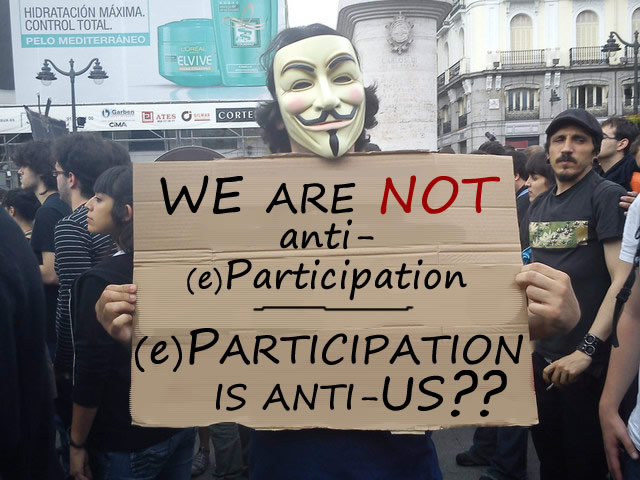Pedro Prieto-Martin, a Spanish researcher and occasional commentator of this blog, just published a paper on the state of the art of e-participation in Europe. Which turns out to be pretty grim:
- The European Commission has taken the lead in promoting the discipline, launching several dedicated research programmes
- since 2000 the EC has funded at least 74 e-participation projects, for a total cost of about 187 million euro; a network of excellence for another 6; and, later, a batch of evaluation and networking initiatives of the existing experiences
- one of these programmes, eParticipation Preparatory Action, has been the object of a systematic evaluation. Projects funded: 20. Average project cost: 715,000 euro. Average number of participants: 450. Average number of user generated contributions (posts or petition signatures): 1,300. Average cost of one post or signature: 550 euro.
The eparticipation research community has managed to ignore these figures. The evaluation studies of the Preparatory Action’s projects are “unanimously positive”. Despite the Commission’s request of a rigorous cost-benefit analysis none of these studies quotes the 550 euro figure. And the Commission itself has decided, although with some corrections, to go ahead: the main difference between this first batch of projects and the next (projects approved for funding in 2009 and 2010) is, according to the paper, their budget, that increased to an average 2.8 million euro. How could the research community overlook these data? According to the author
Handling this kind of “elephant in the living room”-issues is always problematic, as their very existence tends to be denied because of their complexity or the embarrassment they cause and, as a result, they cannot be acknowledged or discussed, let alone get properly sorted out.
Prieto-Martin thinks that the reason for the not-so-great performance of e-participation projects is essentially this: in line with the tradition of European innovation policy, they have been deployed according to a “push” logic. This means incentivizing technology producers to push innovation out to more or less acquiescent users, in the form best suited to the producers’ interests. And the producers did respond with enthusiasm: unfortunately – partly because of the relative lavishness of the funding – they were in general the wrong applicants. Not the best and the most innovative, but the “usual suspects”: organizations that navigate confidently the bureaucratic requirements of European funded research. These requirements are designed to guarantee bang for taxpayers buck and an impartial allocation of resources, but – as CriticalCity’s Augusto Pirovano explains in this short video – ended up excluding from the game small businesses and civil society organizations, the true innovators.
Prieto-Martin is very critical of the situation, and rightly so. On the other hand I am not convinced it is fair to blame the European Commission for the fiasco. It is a Weberian bureaucracy: its discretional power is limited by design. As I have written before all bureaucracies have trouble relating to networked communities: the latter are made of people and find their meaning in the web of diverse person-to-person relationships, whereas Weberian bureaucracies act on the basis of rational, standardized rules applied to all. I still find convincing what I wrote on that occasion:
I see only one way: a new deal between government and the women and men who work for it. Such a new deal would work like this: administrations have to give trust and breathing space to their servants; and then assess their results, rewarding people who get results and punishing people who don’t. If there are abuses of that trust, they will be dealt with on a case-by-case basis: designing an entire system to prevent abuse is at a high risk to making it too rigid, disabling people to offer their best ideas.
I am no lawyer, but I expect Weberian bureaucracies to be prevented by design to reform themselves in the way outlined. Some kind of external legal provision will be necessary for this to happen. Until then, I guess, we’ll have to cope with a certain number of elephants camping out in the living room.
